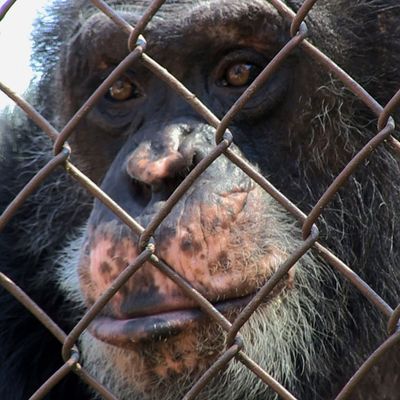
The question of legal personhood for animals is an irresistible, philosophical one that seems to surface in the news from time to time. This week, it’s at the heart of arguments being heard at the New York Supreme Court’s appellate division; the animals in question are Kiko and Tommy, two aging chimpanzees currently being held on private property.
The man who tends to be the reason this question surfaces from time to time is Steven Wise, an animal-rights lawyer who since 2013 has been arguing on behalf of Kiko and Tommy; his goal is for them to live their golden years out at a proper sanctuary.
The term “person” or “personhood” has the effect of making the whole idea seem a touch ridiculous. Animals are not people. People are people. End of story. But in interviews, Wise often points out that “the law divides the world into persons and things.” In that case, the question becomes: Is a chimpanzee more like a person? Or more like a thing?
“A person is not the same thing as a human being, at all,” Wise said. “A person is a legal word meaning ‘it has the capacity for rights.’ Every ‘person’ can have rights. And a ‘thing’ means that you lack the capacity for legal rights.” The “person” category itself is more complex than it initially seems. After all, corporations can be considered “persons”; so can ships. And in one fascinating recent case in New Zealand, the Whanganui River has been recognized as a person. “I know some people will say it’s pretty strange to give a natural resource a legal personality,” lawyer Chris Finlayson told a New Zealand news site, “but it’s no stranger than family trusts, or companies, or incorporated societies.”
And yet: As the Washington Post notes, if these two chimpanzees are given personhood status, that leads to a potentially “slippery slope,” one that “could theoretically lead to the prohibition of all pet-keeping.” (Science writer Rose Eveleth explored this “what if” question at length in a great episode of her podcast, Flash Forward, last summer.) The lines here are already blurring; consider, for instance, an amendment to divorce statutes in Alaska enacted earlier this year, which made the state the first in the nation to treat a divorcing couple’s pets more like children than property.
The changing social status of animals in the U.S. is complicated, confusing stuff, and this latest case will be one to watch. Wise, for his part, is already looking beyond this case, and has tentative plans to next represent an elephant, some California chimps, and, potentially, the orcas at SeaWorld.




